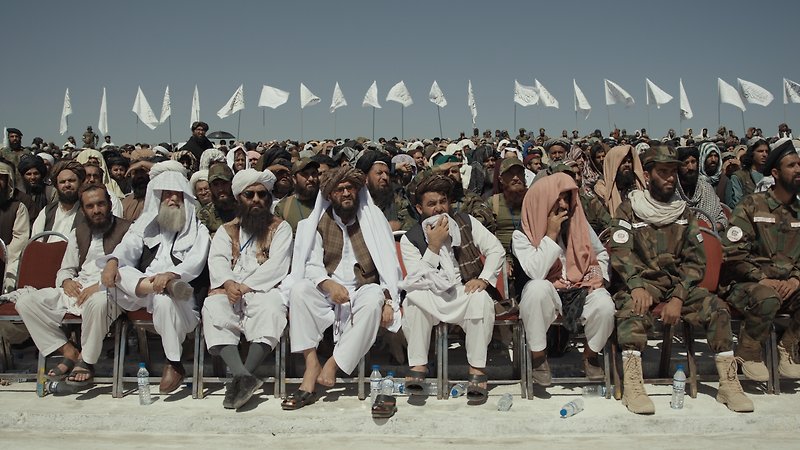A vital and terrifying historical document, this remarkable film follows the first year of the Taliban’s return to power in Afghanistan, revealing the extensive spoils of war left behind by the American occupation.

A documentary that reveals the Taliban like never before, and pretty much confirms Westerners’ fears about them, without Nash’at necessarily having his thumb on the scale.
Screened as part of 2024
Hollywoodgate 2023
The tragedy of Hollywoodgate lies not only in what we see, but what we know to be happening offscreen. With the withdrawal of American troops from Afghanistan in the late 2010s, one of the most catastrophic and unending periods of Western imperialism came to a close, leading to the entirely expected resurgence and recapturing of the country by the Taliban, the brutal Sunni Islamist nationalist cabal that ruled the country prior to the September 11 attacks of 2001.
Just how Egyptian documentarian Ibrahim Nash’at gained access to the innermost workings of the movement known for its secrecy and silencing of opponents is left unexplored – instead, we are thrown headfirst into the inner circle of Malawi Mansour, the head of Afghanistan’s air force, on the day following the exit of the last American soldiers on August 30, 2021. What is immediately apparent is the imminent peril Nash’at faces – his subjects routinely assure each other that one toe out of line will lead to the documentarian’s immediate execution.
The term “Hollywoodgate” refers to the enormous American facility distantly reminiscent of a Hollywood studio lot, which the Taliban leaders gain access to, only to find a treasure trove of medicine, technology and military equipment that they can retool for their own purposes. There’s some pitch black, bitter comedy to be had in the Taliban leaders exploring the facility, utilising gym equipment and raiding the abandoned, alcohol-laden fridges of the living quarters. That is, until they wander past an array of futuristic military helicopters idly waiting to be used. The film is an extraordinary modern document of horror, laying bare the everyday cruelty and spiritual emptiness of the cabal through its dual portraits of Mansour and the ambitious lieutenant Mukhtar, who comes to represent the underlings in this labyrinthine organisation.
Along the way, we understand that Nash’at’s indictment isn’t exclusively reserved for the Taliban, but also for the enormous global superpower that set out to eradicate them, only to leave generational scars and widespread destruction that paved the way for their return. Banal glimpses into the bureaucratic messiness that plagues even this organisation, where the higher-ups seem remarkably underqualified while their followers do the majority of the work, culminate in an astonishing rally that calls to mind the ceremonies of that other infamous, authoritarian regime – that of Kim Jong Un in North Korea.
We are reminded in the watching that all this ugliness and insidiousness is what the Taliban allowed us to see. What haunts you is what couldn’t be filmed. — Tom Augustine